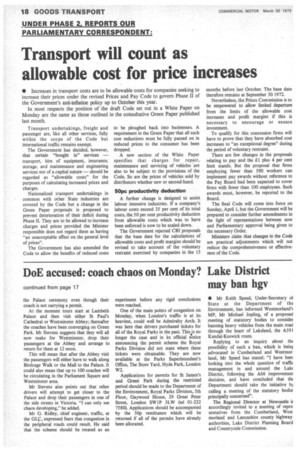Transport will count as allowable cost for price increases
Page 18

If you've noticed an error in this article please click here to report it so we can fix it.
• Increases in transport costs are to be allowable costs for companies seeking to increase their prices under the revised Prices and Pay Code to govern Phase II of the Government's anti-inflation policy up to October this year.
In most respects the position of the draft Code set out in a White Paper on Monday are the same as those outlined in the consultative Green Paper published last month.
Transport undertakings, freight and passenger are, like all other services, fully within the scope of the Code but international traffic remains exempt.
The Government has decided, however, that certain "bought in" services — transport, hire of equipment, insurance, storage, and maintenance and engineering services not of a capital nature — should be regarded as "allowable costs" for the purposes of calculating increased prices and charges.
Nationalized transport undertakings in common with other State industries are covered by the Code but a change in the Green Paper proposals is proposed to prevent deterioration of their deficit during Phase II. They are to be allowed to increase charges and prices provided the Minister responsible does not regard them as having "an unacceptable effect on the general level of prices".
The Government has also amended the Code to allow the benefits of reduced costs to be ploughed back into businesses. A requirement in the Green Paper that all such cost reductions must be fully passed on in reduced prices to the consumer has been dropped.
A new section of the White Paper specifies that charges for repair, maintenance and servicing of vehicles are also to be subject to the provisions of the Code. So are the prices of vehicles sold by distributors whether new or second-hand.
50pc productivity deduction A further change is designed to assist labour intensive industries. If a company's labour costs exceed 35 per cent of its total costs, the 50 per cent productivity deduction from allowable costs which was to have been enforced is now to be scaled down.
The Government rejected CBI proposals that the base date for the calculations of allowable costs and profit margins should be revised to take account of the voluntary restraint exercised by companies in the 15 months before last October. The base date therefore remains at September 30 1972.
Nevertheless, the Prices Commission is to be empowered to allow limited departure from the limits of the allowable cost increases and profit margins if this is necessary to encourage or ensure investment.
To qualify for this concession firms will have to prove that they have absorbed cost increases to "an exceptional degree" during the period of voluntary restraint.
There are few changes in the proposals relating to pay and the £.1 plus 4 per cent limit stands. But the proposal that firms employing fewer than 500 workers can implement pay awards without reference to the Pay Board had been expected to cover firms with fewer than 100 employees. Such awards must, however, be reported to the Board.
The final Code will come into force on Sunday, April 1, but the Government will be prepared to consider further amendments in the light of representations between now and Parliamentary approval being given to the necessary Order.
Ministers claim that changes in the Code are practical adjustments which will not reduce the comprehensiveness or effectiveness of the Code.










































































































